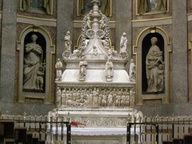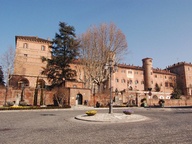Paolo Peroni. So flat, so high
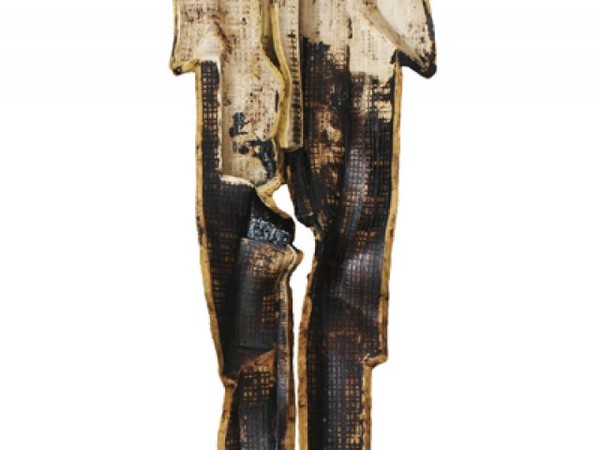
Paolo Peroni. So flat, so high
From 07 Novembre 2015 to 16 Gennaio 2016
Turin
Place: Raffaella De Chirico Art Gallery
Address: via Giolitti 52
Telefono per informazioni: +39 011.83.53.57
E-Mail info: info@dechiricogalleriadarte.it
Official site: http://www.dechiricogalleriadarte.com
A century and a half before Occupy filled the streets and squares of the world, the modern city was already the hotbed of revolutionary ideas, and it was from the urban space that the first winds for social and political change started blowing.
Since time immemorial cities have been theaters where utopian thinking is portrayed, but also centers of capitalist accumulation and, therefore, spaces of conflict with the few who, by controlling access to common resources, determine the quality of life of many. Urbanization has played a primary role in the absorption of surplus capital, fueling processes of "creative destruction" with the sole purpose of creating profit. This latent conflict has periodically exploded in large popular revolts, like the Paris Commune in 1871, following the urban reconfiguration sought by Napoleon III and realized by Haussmann, when the expropriated citizens rose to impose a revolutionary government on the capital. Or like in 1968, with the large urban social movements which agitated Chicago and Berlin, Prague and Mexico City, or again, like the summer of 2011, with the riots that burned the suburbs of London and with the wave of indignation against the financial powers that shook America and Europe.
And it is urban development, the continuous need to destroy to rebuild, which induces Paolo Peroni to conceive his works. The human right to take part in the urbe is the main topic of his project of exhibits that looks at the different facets that represent the physiological norms inherent in the community, assimilated into our lives in a non-conscious manner.
In his Untitled works, Paolo Peroni emphasizes the constant motion of construction and demolition typical of our capitalist model that has become part of our daily lives in terms of urbanization as well. When a pane breaks it generates a map of a city seen from above and the resulting fragments are similar to a Turing pattern, that is, micro-structures that are visible, orderly and spatially periodic and temporally stationary.
Understanding that urban overdevelopment is a global problem, Paolo Peroni offers with Aprivative his intimate condemnation of a phenomenon that seems to be unstoppable: a silicone rubber cast of a skyscraper hanging upside down, wrapped by iron and covered with bitumen. No longer a structure that "scrapes the sky" but precisely its antithesis, dressed in that compound which is nothing but a mixture of the residues resulting from the distillation of crude oil.
The artwork in cement and tar – Untitled – does not leave space to misunderstandings and it is a derivative of the anthropological panorama that we regularly live: it does not add – and does not remove – anything to our everyday life, it wears out slowly until disappearing as the unclaimed images composing our lives.
Quasi sé exemplifies the need of the individual to satisfy their desire for self-subjectivation: it the result of an explosion from which the void left by the explosion is collected. A violent expansion of gases during a detonation, a few fractions of a second, which triggers a series of consequences over which no one has complete mastery nor a precise idea of what they will become. We know only that they will have an irreversible effect.
Humans choose to live in the urban nucleus to protect their freedom: to be part of a plurality means having a better chance of personal affirmation but also has downsides. All the works on display are representative of this double meaning and they are the result of the artist's search.
Since time immemorial cities have been theaters where utopian thinking is portrayed, but also centers of capitalist accumulation and, therefore, spaces of conflict with the few who, by controlling access to common resources, determine the quality of life of many. Urbanization has played a primary role in the absorption of surplus capital, fueling processes of "creative destruction" with the sole purpose of creating profit. This latent conflict has periodically exploded in large popular revolts, like the Paris Commune in 1871, following the urban reconfiguration sought by Napoleon III and realized by Haussmann, when the expropriated citizens rose to impose a revolutionary government on the capital. Or like in 1968, with the large urban social movements which agitated Chicago and Berlin, Prague and Mexico City, or again, like the summer of 2011, with the riots that burned the suburbs of London and with the wave of indignation against the financial powers that shook America and Europe.
And it is urban development, the continuous need to destroy to rebuild, which induces Paolo Peroni to conceive his works. The human right to take part in the urbe is the main topic of his project of exhibits that looks at the different facets that represent the physiological norms inherent in the community, assimilated into our lives in a non-conscious manner.
In his Untitled works, Paolo Peroni emphasizes the constant motion of construction and demolition typical of our capitalist model that has become part of our daily lives in terms of urbanization as well. When a pane breaks it generates a map of a city seen from above and the resulting fragments are similar to a Turing pattern, that is, micro-structures that are visible, orderly and spatially periodic and temporally stationary.
Understanding that urban overdevelopment is a global problem, Paolo Peroni offers with Aprivative his intimate condemnation of a phenomenon that seems to be unstoppable: a silicone rubber cast of a skyscraper hanging upside down, wrapped by iron and covered with bitumen. No longer a structure that "scrapes the sky" but precisely its antithesis, dressed in that compound which is nothing but a mixture of the residues resulting from the distillation of crude oil.
The artwork in cement and tar – Untitled – does not leave space to misunderstandings and it is a derivative of the anthropological panorama that we regularly live: it does not add – and does not remove – anything to our everyday life, it wears out slowly until disappearing as the unclaimed images composing our lives.
Quasi sé exemplifies the need of the individual to satisfy their desire for self-subjectivation: it the result of an explosion from which the void left by the explosion is collected. A violent expansion of gases during a detonation, a few fractions of a second, which triggers a series of consequences over which no one has complete mastery nor a precise idea of what they will become. We know only that they will have an irreversible effect.
Humans choose to live in the urban nucleus to protect their freedom: to be part of a plurality means having a better chance of personal affirmation but also has downsides. All the works on display are representative of this double meaning and they are the result of the artist's search.
SCARICA IL COMUNICATO IN PDF
COMMENTI

-
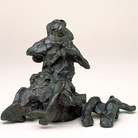 Dal 16 aprile 2024 al 15 settembre 2024
Venezia | Gallerie dell’Accademia
Dal 16 aprile 2024 al 15 settembre 2024
Venezia | Gallerie dell’Accademia
Willem de Kooning and Italy
-
 Dal 17 aprile 2024 al 22 settembre 2024
Venezia | Ateneo Veneto
Dal 17 aprile 2024 al 22 settembre 2024
Venezia | Ateneo Veneto
-
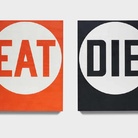 Dal 17 aprile 2024 al 24 novembre 2024
Venezia | Procuratie Vecchie
Dal 17 aprile 2024 al 24 novembre 2024
Venezia | Procuratie Vecchie
-
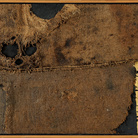 Dal 17 aprile 2024 al 16 giugno 2024
Venezia | Galleria Giorgio Franchetti alla Ca’ d’Oro
Dal 17 aprile 2024 al 16 giugno 2024
Venezia | Galleria Giorgio Franchetti alla Ca’ d’Oro
-
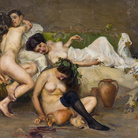 Dal 13 aprile 2024 al 28 luglio 2024
Treviso | Museo Luigi Bailo
Dal 13 aprile 2024 al 28 luglio 2024
Treviso | Museo Luigi Bailo
-
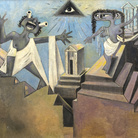 Dal 13 aprile 2024 al 16 settembre 2024
Venezia | Collezione Peggy Guggenheim
Dal 13 aprile 2024 al 16 settembre 2024
Venezia | Collezione Peggy Guggenheim


